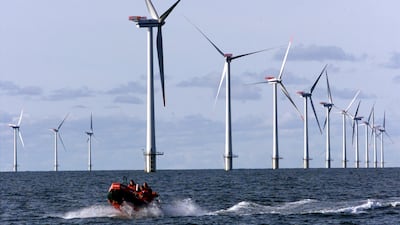North Sea countries will commit on Monday to turning their waters into vast offshore wind farms.
The UK is joining the nine-nation alliance as Europe races to be climate-neutral by 2050.
The countries will pledge at a summit on the Belgian coast to make the seas a “green power plant for Europe”.
They intend for power cables to stretch to the Irish and Celtic Seas, the Atlantic Ocean and to landlocked Luxembourg.
Leaders of Britain, France, Germany, Belgium, the Netherlands, Norway, Ireland, Denmark and Luxembourg called it a “massive undertaking”.
“We need offshore wind turbines — and we need a lot of them,” they wrote in a joint article.
“We need them to reach our climate goals, and to rid ourselves of Russian gas, ensuring a more secure and independent Europe.”
At home, leaders are pitching the clean energy drive as a bringer of jobs and lower bills.
Britain said it could produce 40,000 skilled jobs, as it announced a new undersea power link to the Netherlands.
The LionLink cable will connect the two countries to the planned offshore wind farm grid in the North Sea.
“We are bolstering our energy security and sending a strong signal to [President Vladimir] Putin’s Russia that the days of his dominance over global power markets are well and truly over,” said the UK’s Energy Secretary Grant Shapps.
Four countries — Germany, Belgium, Denmark and the Netherlands — promised last year to double their offshore wind capacity by 2050.
Britain, France, Ireland, Norway and Luxembourg are joining the club for what Belgium called an “XXL summit”.
They are expected to set a target of 300 gigawatts of offshore wind capacity by midcentury — many times their current firepower.
The EU, which does not include the UK or Norway, had 14.6GW of capacity in 2021.

Wind power is regarded as essential to meeting Europe’s goals of reaching net zero carbon emissions by 2050.
Low-lying North Sea countries could be under threat from rising sea levels if global warming is not kept in check.
The end of Russian gas exports to Germany and its European neighbours have given further momentum to the push for home-grown energy.
The EU separately announced on Monday it was forming a Green Alliance with Norway.
It will focus on green technologies such as carbon capture, green hydrogen and batteries for electric vehicles.
Norway has become Europe’s top oil and gas supplier since the Russian invasion of Ukraine, even though it now aims to pivot to wind power.
“Europe still needs reliable and affordable supplies of gas to prepare for the next winter and the next storage filling season,” said European Commission President Ursula von der Leyen.
“I am particularly happy that in the years to come, Norway will maintain its high level of gas supplies.”


